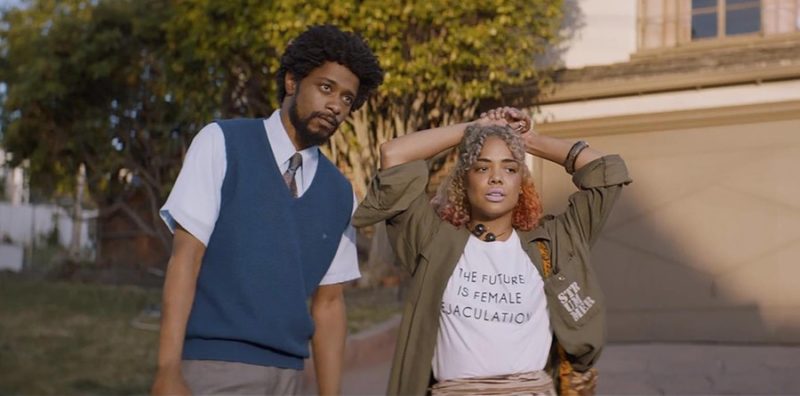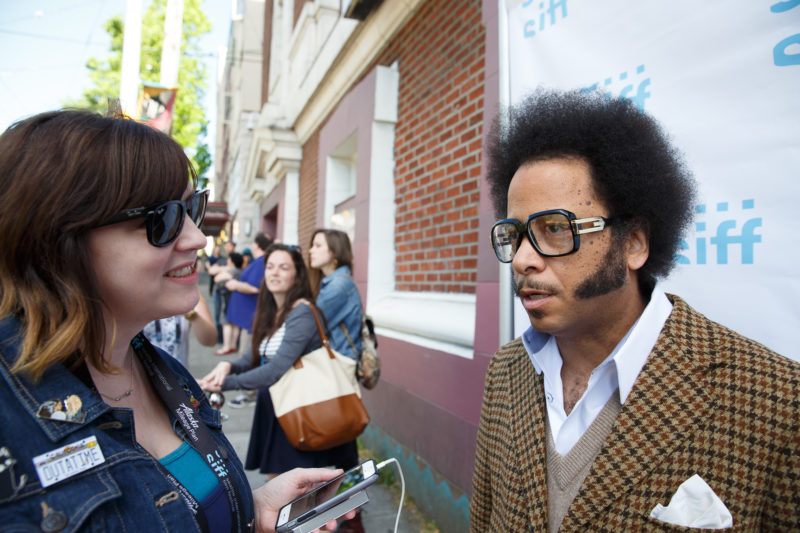Photo: Lakeith Stanfield as Cassius Green & Tessa Thompson as Detroit, in Boots Riley’s Sorry to Bother You. {Imaginary Note: This is my FAVORITE of all the t-shirts she wears, and I want one SO BAD}
In Sorry to Bother You, Cassius Green (Lakeith Stanfield) is in a bad spot. He’s living in his uncle’s garage, down to his last few dollars, and desperate for a job, ANY job — which leads him to a sketchy telemarketing firm where he’s told to “stick to the script,” sell, sell, sell, and aim to make it to the top floor elite: the Power Sellers.
After a rough first few days, Cash gets some invaluable advice from his coworker, Langston (Danny Glover). All he has to do is “use his white voice,” and he’ll sell a ton of product in no time. Sure enough, Cash’s white voice (overdubbed by David Cross) does the trick, and he’s shortly on his way to the coveted Power Sellers floor.
At the same time, his friends are fighting the system: while his coworkers work to create a union in order to get fair wages and benefits, his girlfriend, Detroit (Tessa Thompson), uses her art to to push back against uber-rich mogul Steve Lift (Armie Hammer)’s new agey cult, which is actually a super cheap labor force (oh, hiiiiiiii, Scientology. How you doin’?). It’s not long before Cash has a decision to make: will he ignore what’s happening in order to keep his newfound wealth? Or join his friends to fight the man?
Riley takes us on an over-the-top journey through a society in denial (OMG so much denial), where the most popular television show is called, “I Got the S#*@ Kicked Out of Me,” and a soda-can throwing activist becomes a social media superstar in a matter of hours — and ultimately, into Lift’s insane mansion and inside one of his lavish, cocaine-fueled parties. Confession: I giggled wildly imagining Lift as Bezos every single minute Hammer was on screen.
There’s not much more I can say without giving something away, so I’ll just add that the whole, amazing, diverse cast kicks ass. Lakeith is SO GOOD as Cash, and I was absolutely blown away by the character of Detroit (I touch on this a bit more in my interview below): one of the best female characters I’ve seen on screen with her own agency, strength, and confidence. She’s a feminist artist and activist who makes her own earrings that deliver powerful messages, and not only does she not give any fucks about what people think about her — Riley’s script elevates her and treats her with the same respect that other films reserve only for their male lead.
That might sound like a weird thing to say about an absurdist comedy, but that’s the brilliant thing about Sorry to Bother You: it’s a multi-layered statement about our current social and political climate, addressing racism, slavery, greed, classism, the media, entertainment, and the ways in which people can accept the most heinous things as normal and continue to either not see it, or embrace it as something acceptable (oof) — and it’s also really, really, really, REALLY fucking funny.
The film is in limited release this weekend (July 6) and goes wide July 13 (so uh, we better get it in Seattle then). GO SEE IT as soon as you can!
In the meantime, please enjoy the words of Boots Riley via this interview from his visit to Seattle for the Sorry to Bother You premiere at SIFF {photo of me & Riley at SIFF taken by imaginary rich!}:
Three Imaginary Girls:
There are so many themes you crammed into this, and somehow even though it’s absurd it’s also very REAL. When you started thinking about making the film, were there specific messages you wanted to put out there?
Boots Riley:
I think all I knew when I started making the film was that, one, with a film that happens in a workplace, you’re already dealing with so many dynamics that you could just show the things that happen, and it would display a lot of things without even trying. But separately, I knew I wanted to make it in telemarketing because I’d done that, and I had a lot of stories that could fill it — but also, I knew that there was gonna be a labor struggle that the main character had to deal with. That’s all I knew.
I just always have to trust that if I’m being honest with myself, then my viewpoints about the world are going to be reflected in the work that I do, whether it’s painting a picture or making a song, or making a scene. So I always have to look at what I’m writing and reflect on it to see if it fits what I think the realities of the world are – that’s just how the ideas come in.
TIG:
One thing that I really loved about this film is that Detroit (Tessa Thompson) wasn’t “just” the girlfriend, or Cash’s conscience. She was those things, but she was also her own character with her own agency. Which, as women, we see SO rarely on film. Especially when … [editor’s note: we deleted the specific thing we’re talking about here, to avoid spoilers!]
Was that a decision you made while writing the screenplay? Or did that happen more organically as you were filming?
BR:
It was definitely in the screenplay, and it was definitely a controversial thing. Going through the labs, going through all of it — it was something that I had to fight for.
TIG:
Thank YOU for fighting for that.
BR:
People were saying all kinds of things about it! Even at some early screenings, there was a debate among people that were well meaning, saying, “What did it make her look like?” And it kept coming up. I have to say, once Annapurna [Pictures] got it, people started raising concerns about her character’s actions during a meeting, and Megan [Ellison] was like, “That’s staying in there.” And then people couldn’t say anything about it anymore.
TIG:
Did you weigh in on Detroit’s wardrobe at all?
BR:
Well, her earrings were written into the script. One of my worries when I cast Tessa was that she’s a very well known person and I didn’t want to people to be watching the film and thinking, “This is Tessa Thompson.” So, she was down to change her general look. We sent pictures back and forth of possible hairstyles, and such. It actually caused a problem with Disney, because after she died her hair, she had to do some Thor: Ragnarok reshoots — and they had to make a $10,000 wig for her. There’s even a part in Thor, where they see her and say, “Wow, did you change your hair?” I wonder if that’s … related. *laughing*
TIG:
What are working on next? Can you tell us?
BR:
I can say that I’m working on a TV pilot and a feature film. And The Coup has done a new soundtrack to the movie, which is different than the old album, “Sorry to Bother You.” It’s called “The Sun Exploding.”
Check out more Q&A with Boots Riley at his SIFF premiere here!

